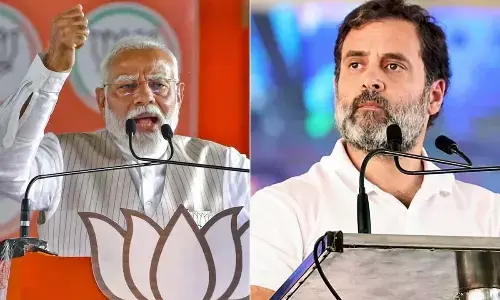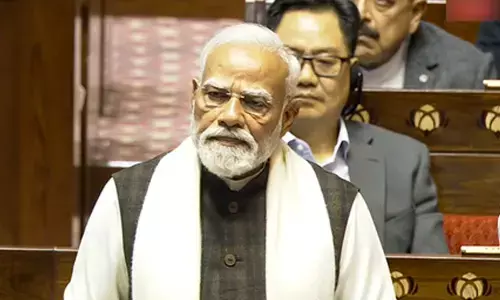Musings on power, and magic, of words

The emotions we feel, the events we experience, and our ability to interact with others are all functions of the instrument of language.
The emotions we feel, the events we experience, and our ability to interact with others are all functions of the instrument of language. Acquiring a greater understanding of the latent power of the spoken or written is the best way of ensuring that one's life goes on in a comfortable and productive manner.
'Word' is one of the most complicated words in the English language largely on account of the fact that it has various uses in different contexts. Words are dynamic and colourful instruments in both the spoken and the written forms. They can have a spectacular effect in certain situations, and can be used to inform, to persuade, to cause or remove pain, and also to start a war or end one. They can, at once, help one get a point across, or destroy, for good, all chances of its being understood.
The ability to put words to use can mean the difference between a life full of rich experience, and one totally lacking in enjoyment. Words cannot only open doorways which hands cannot, but can also break down invisible boundaries. A few words can destroy life or breathe new life into a withering one, and fill a person with happiness or despair. They can either boost a person's self-confidence or crush his self-esteem to the ground. A single phrase can, forever, change your life, just as an act of kindness can.
Towards the end of the Second World War, the Allies sent a message to the Japanese demanding surrender. In reply, the Japanese used the word 'Mokusatsu,' which carried the meaning that they (the Japanese) had no comments to offer for the moment, and would decide after discussions. The allies, however, understood it as meaning that the Japanese had decided to ignore the demand, and proceeded to drop the atom bomb on Nagasaki and Hiroshima, after which the world has never been the same. Clearly, words can mean different things to different people.
John Paul Sartre's famous autobiography, 'words', or 'les mots' in French, is often compared to 'Confessions' by Rousseau, and regarded as a masterpiece of self-analysis. The book explores the entire gamut of the usage of books and language in human life.
The right word used, at the right time, has the ability to make a tremendous impact, the intensity of which depends as much on the utterance as the ingestion. To draw a parallel from contemporary ambience, one has only to listen to Shashi Tharoor's extremely popular speeches. If one sifts the abstruse part of his speeches together with a plethora of uncommon and long expressions he is prone to use, one cannot help admiring his remarkable gift for choosing the 'mot juste.'
Diction and inflection can also alter the way in which an expression is understood. During the course of the war between the Pandavas and the Kauravas in Mahabharat, Yudhisthir, the eldest of the Pandava warriors, informs Dronacharya, the commander-in-chief of the Kaurava army, that Aswathama is dead, Aswathama being the name both of the son of Dronacharya, as well as an elephant which had just been killed. The manner of delivery of that message is such that Dronacharya mistakes it as pertaining to the death of his son. The rest, as usually, is history. An interesting way of understanding such phenomena is to think of words as those which shape and define reality, and etymology as physics. A clear understanding of words we use is just as important as understanding the physical laws of nature. Someone put it aptly, saying that an expanded vocabulary is an expanded universe.
Unfortunately, it is the rare person who values the spoken word. Others often succumb to the weakness of misusing words, assuming their words to work against them and, as a result, going in one direction, while wanting to go in another.
Depending on the context and the intended consequence, spoken or written words or statements can be categorised into many types; for example, 'begging the question,' assumes the truth of the conclusion, instead of supporting it. A statement by a company, saying, "our toothpaste, tastes better," for instance, can leave the meaning open. It is left to the interlocutor to attach meaning to it mentally. Better than what, a matchbox, a typewriter or a computer? The book 'Hidden Persuaders' by Vance Packard delves deeply into the active, subtle and suggestive deception that is practised in the field of advertising.
'Weasel' words or statements are those which are intentionally misleading or ambiguous, such as those begin with expressions like 'informed sources have it…' Then there can be 'complex questions,' which actually comprise two contradictory questions, apparently seeking a yes or no answer. "Have you stopped beating your wife?" is a typical example. 'To keep one's word' is to do what one has promised, while 'to give one's word' means telling the truth. 'In other words' is to express something, 'in a different way, while 'to have a word' is to speak briefly, or to have a quick conversation. Words fail one, when one is unable to speak, while 'word of mouth' is information passing from one to another through people talking and not through the written word. The manner in which the ancient scriptures in different religions were passed on from generation to generation is a striking example of this. Similarly, 'to put words in one's mouth' means falsely, or incorrectly, to report what has been said, while 'to take words out of one's mouth' means that one was thinking precisely the same thing. And shock or surprise is usually expressed, by saying that 'words fail one'.
The word 'word', being versatile, and flexible, lends itself to other usages too. 'Famous last words' refers to an ironic or overconfident assertion, which is usually proved wrong later on, and the final thing that settles an argument or discussion is usually 'the last word.' 'Wordy' is using or expressing too many words, while 'your word against mine' is an expression usually employed to discourage someone from proceeding with a threatened legal action.
One also often comes across words, or statements, that belong to the category of 'double entendre', meaning that they are open to more than one interpretation, one of which is usually risqué.
There are words, and statements, called 'palindromes', which read the same when read backwards. The famous Telugu poet Tenali Ramakrishna, who was one of the 'Ashta Diggaja's, who adorned the court of Krishna Deva Raya of Vijayanagaram empire, was also known as 'Vikatakavi' or the Sarcastic poet'
Then there is the well-known sentence, "able was I ere I saw Elba," which reads the same backwards.
There are also, at least in the Telugu language, works known as 'dwyarthi kavyas' can be read in two ways. 'Raghava Pandaveeyam', for example, narrates the epic Ramayana, when read one way, and the equally revered Mahabharat, when read in another.
Speech balloons (also speech bubbles, dialogue balloons, or word balloons) are a graphic convention used most commonly in comic books, comics, and cartoons to allow words, or even pictures, to represent a character's speech or thoughts. A shape like a speech bubble, emanating from the thinker by a path of small is used to circle conveyed thought.
Time was when one had to put shoulder to wheel, and slog for hours on end, on a battered old typewriter, (Remington was my favourite), to produce an article. Now, thanks to the digital revolution, all one has to do is to boot the laptop and churn out the words. What is more, one can even use the speech to text appliance on the smartphone, which my granddaughter has taught me to do, saving both energy and time.
The oft quoted 'infinite monkey theorem' has it that a monkey, hitting keys at random on a typewriter keyboard or for infinite amount of time, will almost surely type any given text, such as the complete works of Shakespeare. Unfortunately, however, an experiment, carried out in the University of Plymouth in 2002 only resulted in monkeys producing five pages largely consisting of the letter', 'S'. The lead male monkey actually was striking the keyboard with a stone, and the others followed suit!
Incidentally, I have, since I started contributing to this column, penned as many as 3,15,256 words, far less than the stone throwing monkey! And, hopefully somewhat more meaningful!
While the well-known expression has it that 'a picture is worth a thousand words,' there is little taking away from the profound impact words can have in day-to-day life. After all, they come free!
(The writer is formerly Chief Secretary, Government of Andhra Pradesh)














